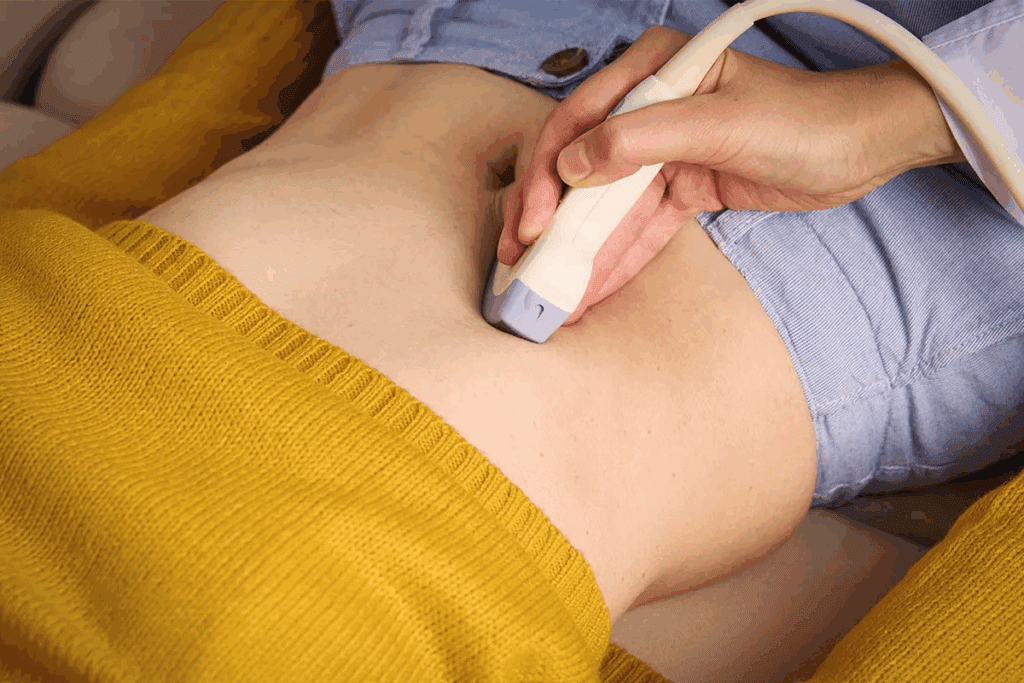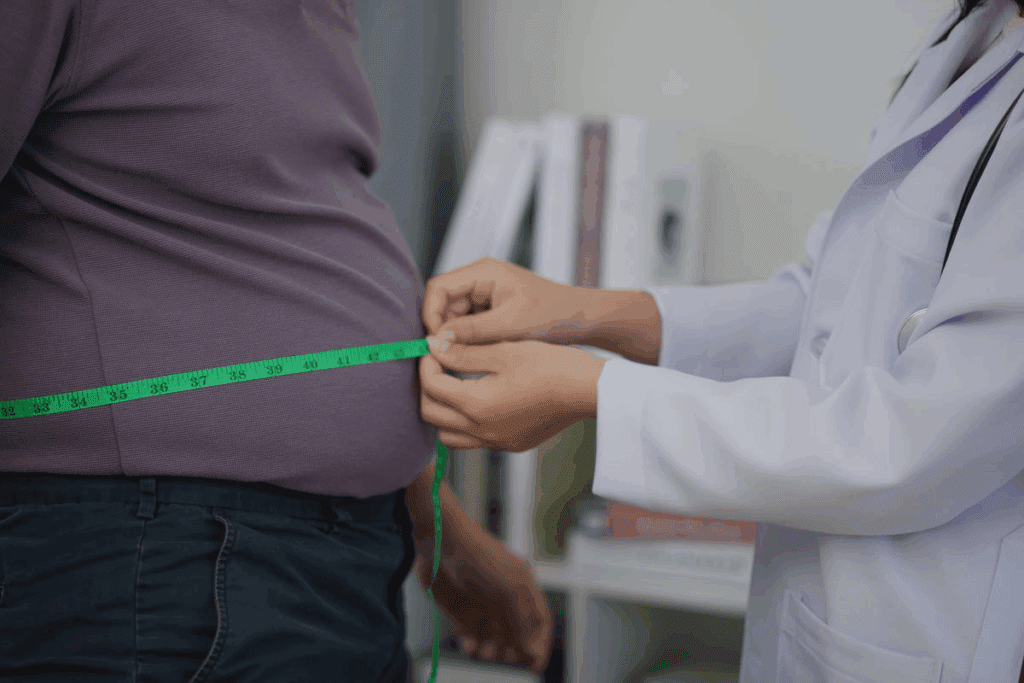Last Updated on November 26, 2025 by Bilal Hasdemir

The gallbladder is key in digestion. It stores and concentrates bile, a liver-made fluid that breaks down fats.
After a cholecystectomy, or gallbladder removal, people might eat less fat. This can lead to weight loss.
At Liv Hospital, care focuses on the patient.gallbladder removal weight lossSickle Cell Weight Loss ““ Why Patients Stay Thin This approach helps manage weight after surgery.

The gallbladder is a small, pear-shaped organ under the liver. It plays a key role in digestion. Knowing how it works and what happens when it’s removed is important for those having cholecystectomy.
The gallbladder stores and concentrates bile, a digestive fluid from the liver. Bile helps with fat digestion in the small intestine. This is key for absorbing fats and vitamins.
Cholecystectomy is the removal of the gallbladder. It’s often done laparoscopically, with small cuts and a camera. The surgery lasts about 1-2 hours and you’ll need a short hospital stay.
Removing the gallbladder is often needed for gallstones, cholecystitis, or other diseases. Here’s a table of common reasons:
| Condition | Description |
| Gallstones | Hardened deposits in the gallbladder, causing pain and blockages. |
| Cholecystitis | Inflammation of the gallbladder, often due to gallstones, leading to severe pain and serious complications. |
| Gallbladder Disease | Diseases like polyps and cancer in the gallbladder, needing surgery. |
Knowing about these conditions and the gallbladder’s role in digestion helps patients prepare for its removal. It affects weight loss and recovery.

Research shows that weight loss after gallbladder surgery is complex. It’s mostly due to changes in eating habits, not the surgery itself.
Studies reveal that diet and digestion changes lead to weight loss after gallbladder removal. A key study found that patients lose weight short-term. This is mainly because they eat fewer calories and change their eating habits.
Not everyone loses weight, and some might even gain. The reasons vary. It depends on how well someone adapts to new dietary habits and their body’s response to surgery.
The reasons for weight changes after gallbladder removal are complex. The absence of the gallbladder affects bile storage and release. This changes how the body digests fats and absorbs nutrients, which can affect weight.
Patients also notice changes in appetite and food tolerance after surgery. Some start eating a low-fat diet to avoid discomfort. Knowing these changes helps manage weight better after gallbladder surgery.
After cholecystectomy, patients start a recovery journey that’s key for their health. This journey has many stages, from the hospital stay to getting back to normal life.
The first part of recovery is the hospital stay. It can last from a few hours to a couple of days. This depends on the surgery type and the patient’s health.
In the first few weeks, patients go through many physical changes. Their body gets used to not having a gallbladder.
The recovery time can vary a lot from person to person. But, most follow a similar path.
Several things can affect how long it takes to recover. These include the patient’s health before surgery, the surgery type, and post-op care.
Knowing the recovery timeline helps patients prepare and manage their health and well-being expectations.
Some people lose weight quickly after their gallbladder is removed. This can happen because of how digestion changes and what they eat after surgery.
After the gallbladder is gone, the body can’t digest fats the same way. The gallbladder holds bile from the liver. This bile helps break down fats in the small intestine.
Without the gallbladder, bile goes straight to the small intestine. This can cause changes in fat digestion and absorption. So, some people might lose weight fast.
Also, people often eat less fat after surgery to feel better. This can help them lose weight. The mix of how bile works differently and eating less fat can cause big weight changes.
Some weight loss after gallbladder surgery is normal. But, rapid or excessive weight loss might mean there’s a problem. It could be because of not getting enough nutrients or not absorbing important vitamins and minerals.
If you’re losing weight too fast, talk to your doctor. They can check if everything is okay. Getting the right advice on what to eat can help avoid problems with losing weight too quickly after gallbladder surgery.
After gallbladder surgery, weight changes are common. They come from diet, body changes, and hormones. People might lose or gain weight for different reasons.
Changing what you eat is a big factor. Doctors often tell patients to eat less fat. This can mean eating fewer calories.
Appetite changes are also important. Some people might eat less after surgery. Others might eat more.
Fluid balance is key for weight changes after surgery. Some might hold more water due to digestion and hormone changes.
Knowing about these factors can help you deal with weight changes after gallbladder surgery. Making smart food choices and paying attention to your body can help manage your weight during recovery.
Managing weight long-term after gallbladder surgery means getting used to new digestion and healthy habits. People who have had their gallbladder removed need to change their lifestyle. This helps keep a healthy weight and overall health.
After the gallbladder is removed, digestion of fats changes. The liver now releases bile into the small intestine instead of the gallbladder. This affects how the body handles fatty foods.
Key adaptations include:
Many people worry about gaining weight back after losing it after gallbladder surgery. Knowing why weight regain happens and how to stop it is important.
| Factors Contributing to Weight Regain | Prevention Strategies |
| Increased appetite | Eating smaller, more frequent meals |
| Poor dietary choices | Focusing on a balanced diet rich in fruits, vegetables, and lean proteins |
| Reduced physical activity | Engaging in regular exercise, such as walking or swimming |
It’s important for patients to have realistic weight loss goals after gallbladder removal. Some may lose a lot of weight, while others may not. Pre-surgery weight, overall health, and following dietary advice after surgery are key factors.
Realistic weight management involves:
Removing the gallbladder changes how the body digests fats and affects weight. The body must adjust to the loss of the gallbladder.
Cholecystectomy leads to a big change in fat digestion. The gallbladder stores bile from the liver and releases it to break down fats in the small intestine. Without it, bile flows straight into the small intestine, which might change how fats are digested.
Key changes in fat digestion include:
The constant flow of bile into the intestine causes digestive changes. These changes include shifts in the gut environment and possible irritation of the intestinal lining from bile.
| Aspect | Pre-Cholecystectomy | Post-Cholecystectomy |
| Bile Storage | Gallbladder stores bile | Bile flows directly into the intestine |
| Fat Digestion | Efficient emulsification of fats during meals | Continuous bile flow; less efficient fat digestion |
| Gut Environment | Normal gut microbiota balance | Potential changes in gut microbiota |
It’s important to understand these changes for managing weight and digestive health after gallbladder removal. By making diet and lifestyle changes, people can lessen the negative effects on weight and digestion.
A well-planned diet is key for weight management and health after gallbladder surgery. Without the gallbladder, the body has trouble digesting fats. This means you need to change your diet to manage weight and avoid digestive problems.
Starting a low-fat diet is important for weight management after gallbladder surgery. Without the gallbladder, it’s hard to digest fatty foods. Reducing fat intake can help avoid symptoms like diarrhea and discomfort.
Meal timing and portion control are key for weight management after gallbladder surgery. Eating smaller, more frequent meals can ease digestive discomfort and help with weight loss.
Adding foods that support digestive health can help with weight management. Foods high in fiber, like fruits, vegetables, and whole grains, help with bowel movements and digestion.
By following these dietary tips, you can manage your weight and improve your digestive health after gallbladder surgery.
Exercise is key in recovering from cholecystectomy. It helps with health and weight. A good exercise plan can boost strength, lower complication risks, and enhance life quality.
The time to start exercising again varies. It depends on health and surgery details. Most can walk lightly a few days after surgery.
Some exercises are great for recovery. These include:
Creating a lasting fitness plan starts with setting achievable goals. Increase activities slowly. Always listen to your body, avoiding overexertion, mainly early on.
| Activity Level | Timeline | Examples |
| Low | 1-2 weeks post-surgery | Short walks, light stretching |
| Moderate | 2-4 weeks post-surgery | Brisk walking, yoga, light swimming |
| High | 4-6 weeks post-surgery | Strength training, high-intensity cardio |
Following these guidelines helps support recovery after cholecystectomy. It improves health and lowers future risks.
Managing digestive issues after gallbladder surgery is vital for a healthy weight. After gallbladder removal, many patients face digestive symptoms. These symptoms can greatly affect their weight management.
Diarrhea and malabsorption are common after gallbladder surgery. Diarrhea can cause dehydration and electrolyte imbalances. To manage these, patients can:
Post-cholecystectomy syndrome includes symptoms like abdominal pain and bloating after gallbladder removal. To manage these symptoms, patients can:
Some supplements and medications can help with digestive symptoms after surgery. These include:
Always talk to a healthcare provider before starting new supplements or medications. This ensures they are safe and right for you.
Gallbladder removal, or cholecystectomy, is often linked to weight loss myths. People thinking about or who have had this surgery worry about weight changes. Knowing the truth can help set realistic goals.
Many think gallbladder removal means guaranteed weight loss. But, the link between surgery and weight change is complex. Some lose weight, others gain, or stay the same.
The weight impact depends on diet and digestion changes. Some might lose weight at first due to diet changes. But, this isn’t true for everyone.
| Factors Influencing Weight | Potential Effects |
| Dietary Changes | Weight loss or gain depending on food choices |
| Reduced Fat Digestion | Potential for weight loss if fat intake is significantly reduced |
| Changes in Metabolism | Variable effects on weight |
Some believe they must follow strict diets forever after gallbladder removal. While diet changes are needed, not all are permanent.
At first, a low-fat diet helps with digestion. Later, many can eat a variety of foods again. But, some might need to avoid very fatty foods.
Many think they can’t digest fats after gallbladder removal. The gallbladder stores bile for fat digestion. Without it, bile goes straight to the intestine, affecting fat digestion.
But, the body adjusts, and most can digest fats okay. Some might get diarrhea or feel uncomfortable after eating a lot of fat. This doesn’t mean they can’t digest fats at all.
By understanding these myths, patients can better handle their weight loss journey. They can make smart choices about diet and lifestyle after surgery.
Managing weight after gallbladder surgery needs a full understanding of how it affects the body. A balanced diet, regular exercise, and healthy habits are key. These steps help patients manage their weight successfully.
Eating low-fat foods, timing meals, and controlling portions can ease digestive changes. Exercise not only aids in weight loss but also boosts overall health. It’s important to watch for digestive symptoms and deal with them quickly to stay at a healthy weight.
Making smart lifestyle choices is the way to manage weight after gallbladder surgery. The right approach can help keep a healthy weight and improve life quality. With a balanced lifestyle, managing weight after surgery is possible.
Gallbladder removal surgery can change your weight, but how much and in what way varies. Some people might lose weight, while others might not.
Weight loss after surgery can happen for a few reasons. Changes in appetite, dietary rules, and how the body digests fat play a part. Some might eat fewer calories or change their eating habits, leading to weight loss.
Yes, losing weight after gallbladder removal is possible. It depends on many factors, like diet, exercise, and overall health.
Removing the gallbladder can change digestion, mainly fat digestion. The gallbladder helps store and release bile. Changes in bile flow and fat digestion can affect weight.
After cholecystectomy, recovery usually starts with a hospital stay. Then, several weeks at home are needed. The first 1-4 weeks can be tiring, uncomfortable, and affect appetite.
To manage weight after surgery, eat healthy, including low-fat foods. Control portions and meal times. Regular exercise and a good fitness routine are also key.
Symptoms like diarrhea, malabsorption, and post-cholecystectomy syndrome are common. These can affect weight and overall health.
Yes, preventing weight regain needs a long-term commitment. Stick to a balanced diet and regular exercise.
Yes, foods high in fiber, lean proteins, and healthy fats can aid digestion after surgery.
If you lose weight quickly after surgery, see a doctor. It could be a sign of a health issue or nutritional problem.
Yes, some supplements and medications can help with symptoms like diarrhea or malabsorption. Talk to a healthcare professional to find the right treatment.
Subscribe to our e-newsletter to stay informed about the latest innovations in the world of health and exclusive offers!